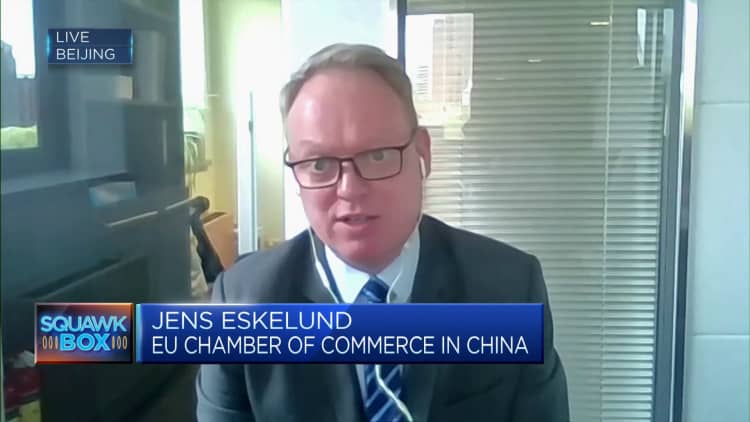Ole Kaällenius (front, r), CEO of Mercedes, signs a memorandum of understanding on cooperation on June 20, 2023, alongside Zhimin Qian (front, l), Chairman of the State Power Investment Corporation, in front of Li Qiang (back, l), Premier of the People’s Republic of China, and German Chancellor Olaf Scholz (SPD, back, r).
Picture Alliance | Picture Alliance | Getty Images
European businesses in China are experiencing greater difficulties operating in the country, even after it reopened post-Covid, according to the EU Chamber of Commerce in China’s latest member survey, released Wednesday. The survey found that the mainland lifted its strict Covid controls in December and promised to facilitate business travel. However, the initial economic recovery has stalled and regulatory obstacles persist. The Chamber’s report states, “Zero-Covid has ended, but other challenges need to be addressed to restore China’s appeal.” The annual business confidence survey revealed a significant increase in companies reporting missed opportunities in China due to market access restrictions and regulatory barriers. While some of these challenges are related to Covid measures, the overall outlook remains bleak. Jens Eskelund, president of the EU Chamber of Commerce in China, stated in a briefing that there is “no expectation that the regulatory environment is really going to improve over the next five years.”

Ambiguous rules and regulations continue to pose the most significant regulatory obstacle for businesses in China, as stated in the report for the seventh consecutive year. Over the past few years, China has intensified its regulatory efforts. Some of these efforts targeted alleged monopolistic practices in the internet technology sector, which had been allowed to grow rapidly with few restrictions. Other regulations aimed to establish parameters for personal data protection, similar to privacy rules in Europe. However, this year, China has emphasized national security and expanded its counter-espionage law. Reports of raids or investigations into foreign consulting firms in China have also unsettled business leaders abroad. Eskelund mentioned that foreign businesses are still awaiting clarity on the new regulations, just as they have been waiting for rules released more than five years ago. He stated, “I think we will need to see how this actually pans out in reality. We are not aware of a great many companies who felt impacted in concrete terms.”
Slowing China growth the top challenge
The survey of European businesses revealed that their primary challenges are economic, particularly with regards to the slowing growth in China and globally. U.S.-China trade tensions ranked third in the report. China’s economic data for May, which fell short of expectations and indicated a slowdown from the previous month, added to these concerns. Eskelund stated, “At the end of the day, the most important factor is what we are able to sell. Economic concerns are perceived as more significant than politics by European companies.” He noted that members have expressed more concerns about China’s economy in recent weeks compared to when the survey was conducted. The chamber conducted the study from February to early March.
Impact on foreign investment
The uncertainty and macroeconomic conditions have had a negative impact on foreign investment in China. According to the survey, only 55% of respondents stated that China is one of their top three investment destinations, the lowest percentage since the question was included in the survey in 2010. Eskelund mentioned that no small or medium-sized companies have come to China since the end of 2019, based on chamber inquiries at embassies. The CNBC request for comment on this story from China’s Ministry of Commerce went unanswered. The ministry has declared 2023 as an “Invest in China Year,” and local governments have been actively seeking foreign investment. Premier Li Qiang also had meetings with German businesses this week during his first overseas trip in his role as premier, which he assumed this year according to state media.
Li is also scheduled to deliver a keynote speech and meet with global business leaders at the World Economic Forum’s conference in Tianjin, China next week. Eskelund stated that EU Chamber members appreciate government engagement and acknowledged that business conditions vary by industry. However, he noted that over a quarter of the surveyed respondents “never expect to see a meaningful opening of the market.”
Denial of responsibility! VigourTimes is an automatic aggregator of Global media. In each content, the hyperlink to the primary source is specified. All trademarks belong to their rightful owners, and all materials to their authors. For any complaint, please reach us at – [email protected]. We will take necessary action within 24 hours.


